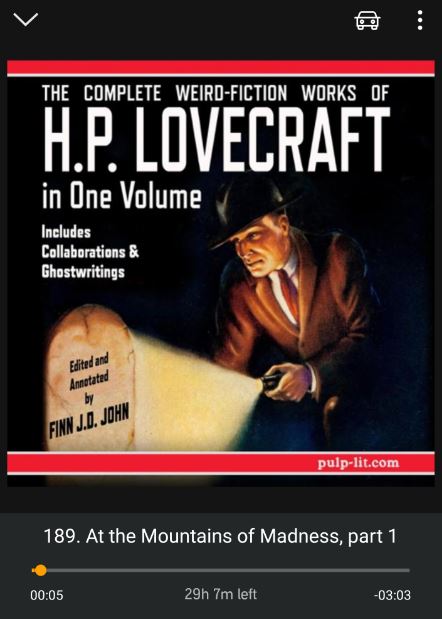So not to fanboy out too much, but this is my absolute favorite Lovecraft collection put together. It's compiled by Finn J.D. John. Why I love it so much is because outside of S.T. Joshi's "I am Providence," nothing has ever given me so much Lovecraft backstory and context like this.
John puts all, and I do mean all, of Lovecraft's fiction together in one volume, but he also puts them in chronological order as to when they were published. This lets you see how Lovecraft developed as a storyteller from the beginning to the end of his career.
What is truly my favorite part of the collection, other than the stories themselves, is that between each story, John also gives us snippets of a biography on Lovecraft. It's a very long read since it's the sum total of Lovecraft's life and an incredibly intimate experience as you get to know the man while reading his fiction because of how the biography and the fiction are woven together.
I've read this collection twice now, and one of the things that stuck with me both times is how much Lovecraft changed as a person as he grew older. He's often remembered for when he was at his worst, racism-wise when he was a young man. But a little-known story, toward the end of Lovecraft's life, called "In the Walls of Eryx" often makes me wonder what would Lovecraft have produced if he had a few more decades.
"In the Walls of Eryx" was technically Kenneth J. Sterling's story, but he was a young man collaborating with Lovecraft, who probably wrote the bulk of the story. It's very different from the jump than anything else Lovecraft wrote, but its crux is humanity is a spacefaring race in the story and is in conflict with the natives who live on Venus. With all the swagger of an odious imperialist, the protagonist is only on Venus to strip it and, by extension, the natives of their resources. He views them as inferior beings, not worth worrying about if they live or die.
Then something strange happens toward the end of the story. Even as the natives manage to trick the protagonist, and they're still in mortal conflict, he begins to respect them. He even realizes that humanity is in the wrong, that the natives are just trying to defend their homes. Then he considers that in the grand scheme of the wide universe, and all time, who is to say which race is superior in the long run, and maybe the distinction doesn't matter.
Sure, it was a story initially conceived by someone else, but for a man like Lovecraft to work on it, who was firmly a white supremacist as a young man, that story turn is revelatory. That's why I wonder, what would the man have written if he had a few more decades and didn't die of stomach cancer tragically soon after.
This preview is an Amazon Affiliate link;
as an Amazon Associate, I earn from qualifying purchases.
Author’s Website: http://finnjohn.com/


No comments:
Post a Comment